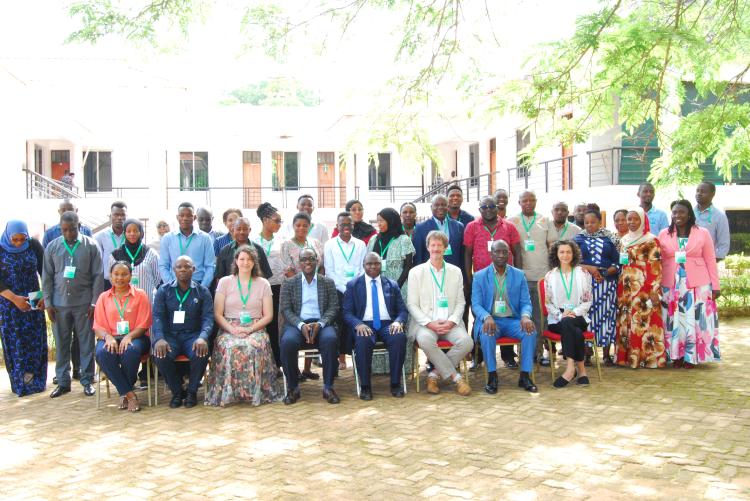
Main Theme: Climate Finance and Nature Based Solutions: An
Ecohydrology Approach
Host: UNESCO Chair on Ecohydrology and Transboundary Water Management
Sokoine University of Agriculture, Morogoro Tanzania
Partners: UNESCO IHP (Paris – France), ERCE (Lodz Poland), UNESCO Chair for Water, Ecosystems
and Societies (Faro – Portugal), UNESCO Chair in Inter-Religious and Cultural Dialogues (Mumbai –
India), and Equiplus Tanzania Ltd (Tanzania)
November 25th – 29th, 2024: National Carbon Monitoring Centre (NCMC) – Sokoine University of
Agriculture, Morogoro Tanzania
An overview
Our world faces many major environmental problems that cause reduction of ecosystem services that are vital for human survival and livelihoods. Among the problems include climate change (CC), biodiversity loss, watershed alteration, water and air pollution, deforestation, to name a few. These problems are affecting the capacity of watersheds and rivers to provide ecosystem services for human consumption and ecological integrity. Africa is probably the most vulnerable continent to CC and variability not only because of the dependence of many of its economies on agriculture, but also because of the presence of other environmental stresses.
In recent years, CC has posed a serious threat to human beings and to the environment. Degrading ecosystems is a phenomenon we are increasingly facing, calling for new solutions. Biodiversity loss and CC pose tremendous challenges to our planet and its people. Hundreds of millions of people are already exposed to the effects of biodiversity loss and CC. Restoring nature can help people to adapt by providing an ongoing source of food and other ecosystem services that support livelihoods, whilst also providing protection against extreme weather events. The nexus between climate finance, nature-based solutions and Ecohydrology is crucial for ecosystems restoration, resilience and sustainable supply of ecosystem services.
Objective of the training
To build the capacity of participants on climate finance, nature-based solutions and Ecohydrology for
sustainable flow of ecosystem services and resilience to the changing climate.
Tentative topics
This particular training will focus on:
• Climate finance and green economy
• Gender and water resources management
• Nature-based solution and climate change / carbon credit
• Enhancing the blue economy for people and nature
• UNESCO designated sites (Biosphere Reserves, World Heritage Sites and Geoparks)
• Climate-Food-Water-Ecosystem Nexus
• MoniGloG: A framework for monitoring biodiversity in protected areas and other effective
area-based conservation measures – IUCN Guideline
• Impact of climate change in the banking sector and role in disaster risk reduction
• Linking microfinance institutions and climate change mitigation / adaptation
• Unlocking the potential for nature-based solutions
• Climate change and geohydrology
• PAM Toolbox: Management Tool for Protected Areas
• Estuarine, coastal wetlands and mangrove forest restoration
• River basin and riparian vegetation management
• Bankable nature solutions, landscape restoration and blended finance for conservation
• The use of biotechnology in water resources management
• The nexus between UN Sustainable Development Goals and Ecohydrology
• Wetland dynamics and aquatic biodiversity: Challenges and opportunies
• Rights of Nature: Instruments to conserve and manage rivers and riparian landscapes
• Practical Application of Environmental Impact Assessment (EIA) and Strategic Environmental
Assessment (SEA)
• Nature based solutions for bioremediation of contaminated environments
• Introduction to French Language for beginners (II)
• Field excursion (Mikumi / Saadan National Park)
Target group / who can apply
The primary candidates for this training course are young scientists working in the conservation
sector, bank sector and other financial institutions, development practitioners, higher learning and
research institutions, non-governmental conservation organizations, protected areas authorities,
central and local government, to name just a few.
How to apply
Interested applicants are required to submit the following:
• 3 pages CV with contact information of two referees
• Proof of support (institutional/private) to pay registration fee (USD 250*)
• I page motivation letter
• Front page of a valid passport (foreign applicants only)
Please email your application as a single PDF file to: makarius.lalika@yahoo.com,
anordiusgeorge3@gmail.com and lalika_2mc@sua.ac.tz and by November 5th, 2024. Incomplete
application won’t be considered for evaluation and only successful applicants will be contacted.
Award
Trainees who successfully complete the training will receive Certificates of Attendance.
Instructors
1) Prof. Maciej Zalewski – ERCE / University of Lodz, Poland
2) Dr. Rahmah Elfithri – UNESCO HQ Paris, France
3) Dr. Makarius C.S. Lalika – Sokoine University of Agriculture /UNESCO Chair, Tanzania
4) Prof. Luis Chicharo – University of Algarve, Portugal
5) Prof. Hilary Inyang – GISDAAD, United States of America
6) Dr. Miguel Gonzalez- Organisation of Southern Cooperation, Addis Ababa, Ethiopia
7) Ms. Elisabeth Wiegele – University of Carinthia, Austria
8) Mr. Keven Robert – UNESCO Dar es Salaam Office, Tanzania
9) Dr. Pascal Breil – University of Lyon, France
10) Ms. Vanessa Berger – University of Carinthia, Austria
11) Dr. Emmanuel Japhet- Wetland International, Tanzania
12) Dr. Olfa Ben Said –National Centre of Nuclear Sciences and Technology, Tunisia
13) Dr. Enock Chambile – Sokoine University of Agriculture, Tanzania
14) Prof. Michael McClain – UNESCO IHE, The Netherlands
Thirty (30) participants will be admitted and female candidates are highly encouraged to apply. Applications will be treated based on “first come-first served basis”.
*Registration fees will be used to cover breakfast, lunch, evening coffee and production of training
materials and certificates. Therefore, applications are encouraged to ask for support from their
employers /sponsors to cover costs related to transport to Morogoro, accommodation and dinner.
For questions and clarifications, kindly do not hesitate to contact:
Makarius C.S. Lalika, PhD.
Chairholder and Coordinator,
UNESCO Chair on Ecohydrology and Transboundary Water Management, College of Natural
and Applied Sciences, Sokoine University of Agriculture,
IAGRI Premises, 1st Floor, Room number 17,
P.O. Box 3038 Morogoro TANZANIA.
Email: makarius.lalika@yahoo.com, lalika_2mc@sua.ac.tz
Whatsap: +255 754 201 306

